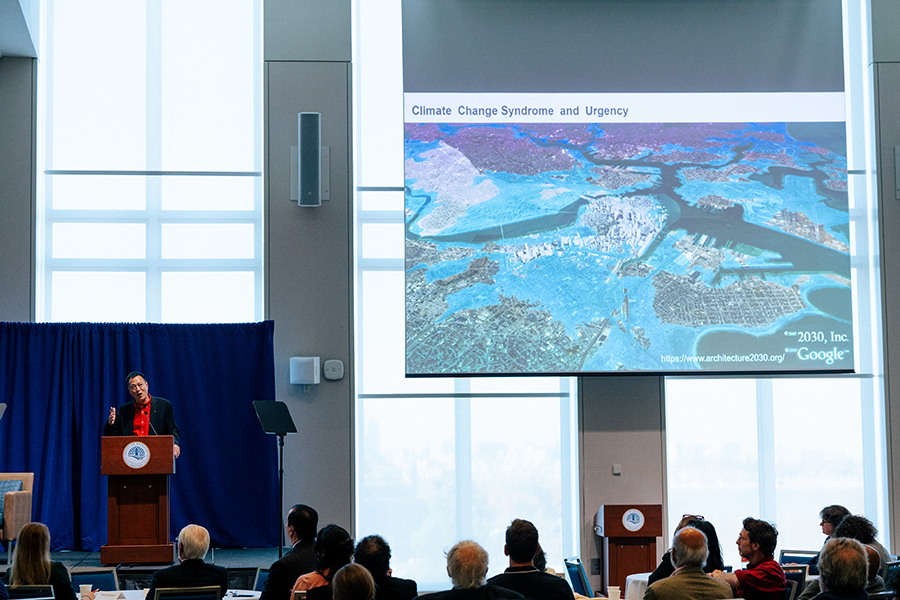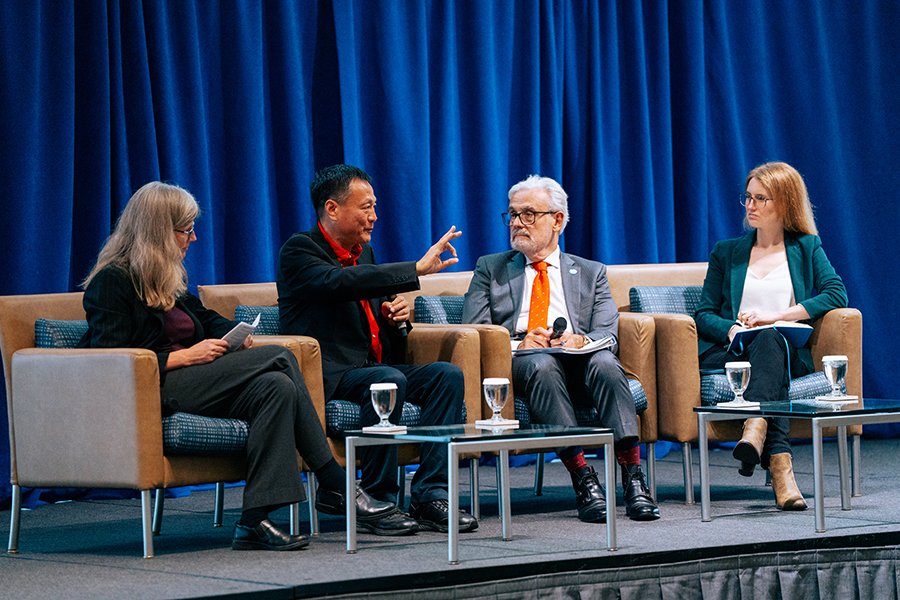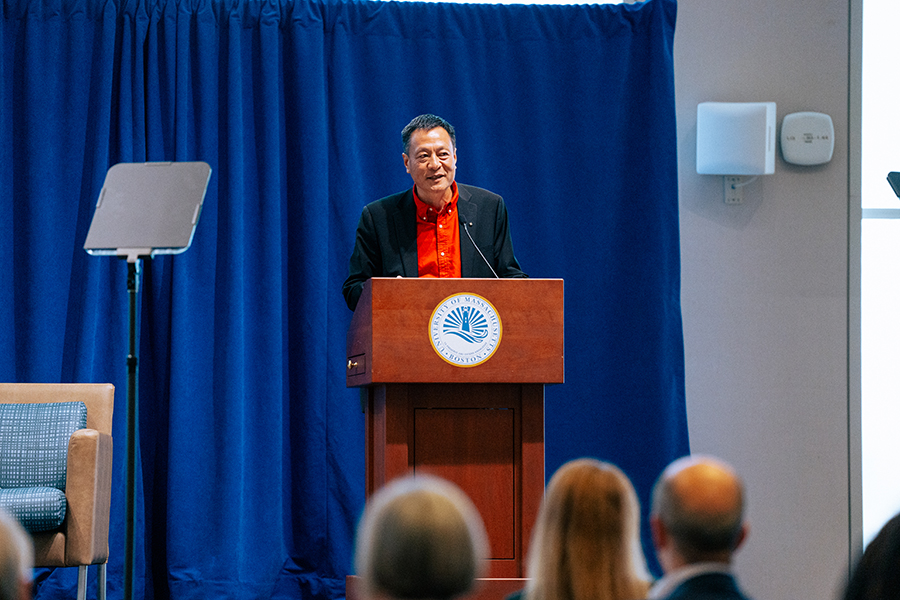- Home
- News
- Recent News
- Landscape Architect Kongjian Yu Talks Sponge Cities at UMass Boston
Landscape Architect Kongjian Yu Talks Sponge Cities at Chancellor’s Lecture Series
As climate change leads to more intense storms and flooding in cities across the world, renowned landscape architect Kongjian Yu is urging us to move away from concrete-based solutions that build walls against water and instead—to “embrace the water.”
Yu, a professor and founding dean of Peking University College of Architecture and Landscape and founder and design principal of Turenscape, shared his groundbreaking concept of “sponge cities” as part of the Chancellor’s Lecture Series on October 24.
He highlighted the urgent need for urban areas to rethink how they manage water, underscoring the importance of forward-thinking design in building climate-resilient futures.
“A sponge. That's my imagination, my vision. How can we restore the planet like a sponge?” Yu said.
Yu explained that in the past 300 years, 70 percent of wetlands around the globe disappeared and the aquifer has been depleted. And the data show that 40 percent of the sea level rising actually comes from the water being squeezed from the globe.
“So if we recharge the aquifer and restore this 70 percent of wetlands, we virtually return to sponge and reduce the sea level rising dramatically,” he said.

A leading voice in ecological urban design, Yu emphasized that traditional infrastructure methods, such as concrete flood barriers, often fail to protect cities from extreme weather events intensified by climate change. Instead, his sponge city model advocates for more urban parks, gardens, green spaces, wetlands, nature strips, and permeable pavings—resilient landscapes that absorb, store, and naturally filter water, transforming urban spaces into ecosystems that work harmoniously with nature.
Yu illustrated successful implementations of sponge city principles in various projects across China and Thailand, where once flood-prone areas now feature permeable surfaces, wetlands, and green spaces that mitigate flooding while enhancing biodiversity and community well-being. His projects include the Sanya Dong'an Wetland Park, Nanchang Fish Tail Park, and Benjakitti Forest Park.
“Some will say, OK, the globe is so big. How can you build it as fast as possible in 5 years, 10 years, 20 years. I have to say that that’s the beauty of the sponge idea— minimal intervention, nature-based, simple, low-tech, very simple,” he said.
This was the third event in the Climate Crisis to Climate Resilience Chancellor’s Lecture Series, which was established by Chancellor Marcelo Suárez-Orozco in 2023 to engage distinguished scholars on global challenges that define our times.
World-renowned climate scholar Dr. Ram Ramanathan kicked off the lecture series last November, presenting on his strategy for bending the emissions curve and building resilience to climate stress, which he and Suárez-Orozco formally unveiled at the Vatican Global Climate Summit earlier this year. Vanessa Kerry, co-founder and CEO of Seed Global Health, joined the chancellor to discuss climate change's profound impacts on global public health in April.

After the most recent lecture, GBH and PRX's The World cohost Carolyn Beeler led a fireside chat with Yu, Chancellor Suárez-Orozco, and School for the Environment Dean Carol Thornber, discussing what opportunities there might be for more nature-based solutions in Boston.
“I will say Boston has some great opportunities and some great challenges just in terms of our resilience and our ability to change,” said Dean Thornber, pointing to work being done through the Stone Living Lab exploring different approaches to climate change. “The city of Boston has a lot of areas that are very, very close to sea level that are prone to flooding during high tides and a lot of very built-up infrastructure.”
Chancellor Suárez-Orozco explained how in the fight against climate change, most of the effort has been targeted at decarbonization, the reduction or elimination of carbon dioxide emissions resulting from human activity.
“It's now time to catch up and to get in front of the societal transformation, the entire adaptation infrastructure that will be required to get us to a world that is more humane, that is better and more adaptable to long-term sustainability,” he said.
The chancellor pointed to French writer Antoine de Saint-Exupéry, who wrote how a rock pile is just that until someone comes along, contemplates it, and imagines a cathedral.
“In the rocks, see the beautiful sponges that we need to build for the future,” he said. “The problems now and moving forward will be problems of education, will be problems of imagination, will be problems of getting us to see and to engineer a better way of adapting what we have been doing, which is painfully obvious is not working.”

